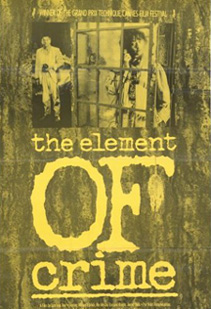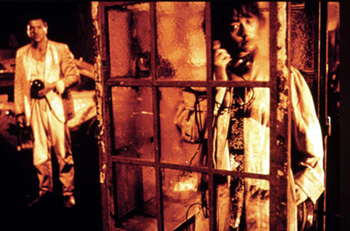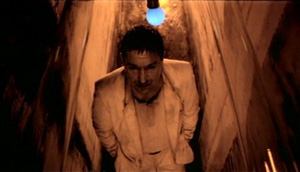Well, let me go ahead and first state that this has to be one of the most unique crime films ever made. It is also the first feature I have ever seen from acclaimed auteur, Lars von Trier.

Taking place in a grimy, seedy town in Europe, and sporting a sepia tone, The Element of Crime seems like a traditional detective story; a man named Fisher (Michael Elphick), who is an apprentice to Osborne (Esmond Knight), a former profiler who has apparently lost his mind, has been called in to replace his mentor in investigating the gruesome murders of young girls, but something else, something eerily distorted and strange takes a hold of me while I am watching this film, and it is not just the graphic subject matter, but the grotesquely archaic, unsettling and, at times, claustrophobic atmosphere that surrounds our protagonist, Fisher; the only man in this film who comes as close to "humanly" to the naked eye.
When watching von Trier's The Element of Crime, one of the first aspects you will notice is how seedy and dirty everything looks. Not necessarily gritty, in the sense of old-fashioned film-noir, but soiled; as if trying to look through a drinking glass that has been left outside for months to a year. Also everything is dim to a sort of determined effect that works to a creepy sort of brilliance. It's as if the town has a shortage on lights, yet there are plenty of lamps, but in contrast to our reality, where we shine a light to distinguish what we have trouble seeing, in this world, the lights are all faint in a peculiar way; as if everything is purposely hiding in the shadows.
In the world of The Element of Crime, it seems like the more civilized aspects of life are completely absent. Every scene hints that this place once had a structure and is far past the twilight hours of decomposition, like a tooth that is decayed. The methods of everything, from the transit to the "traditional" methods of solving the crime are as outmoded as a story set in Victorian London, yet this world reeks exquisitely with the recklessness of that of a spaghetti western. At different points throughout the film, at least three characters are seen thoughtlessly shooting off a revolver.
One of the most important scenes, I felt was near the beginning, when the protagonist, Fisher takes notice to a melancholy old man with a beautiful horse pulling a carriage full of apples near the scene of a crime. Fisher points out in his mind, how peculiar this was in contrast to all the stained, uncivil dystopia surrounding him. Within minutes, the police force invades the scene and chaos erupts, causing the horse to push itself into the water. Within seconds a man shoots the horse dead. It felt like this had been done to show how even the most poignant pieces of this town can so quickly be brought to the same lower depths of filth as everything else inside it. We see the horse's death as an invitation of sorts into the disorder of this realm.
That is a word that best defines The Element of Crime: disorder. I personally found Fisher's methods of solving the case to be unconventional, yet non-hasty; in fact, almost procedural, and effective specifically with the tone of the film. I suppose it depends upon how one perceives it, yet once we are given these constant glimpses of madness and disarray, especially brought on by the police themselves, we see how Fisher's way is obsolete in this realm. In a world full of chaos, only more chaos seems to balance the unbalanced, but the real question I find myself asking is: Is Fisher's method of solving the case breaking this customary chaos, or is he only adding more fuel to the fire?

One of the film's best aspects is the plot itself, as well as the character study of the protagonist. The idea of a man so out of place by his own will; Fisher is indeed a rather enigmatic protagonist, which feels contradicting to say, since throughout the film, we get to know him more and more, especially through exceptional voice-over narration, but he still manages to put up such a convincing emotional wall that it's hard to read just what's going on inside his head. Instead, he only shows us what he wants us to see; his determination to solve the case. In a world this bad, it does not necessarily matter how low Fisher stoops to get the job done. His methods are all contrived from the book Osborne wrote, a book that is despised by this dystopic realm, a key detail which gives the viewer the choice to either agree or disagree with this unsettling system. This system that seems to have some sort of potency that keeps driving Fisher to plunge into even darker territory, both in reality and in his mind. Next to the bizarre setting and scenery this is probably my favorite aspect of the film; the focus on Fisher as we, the viewers, serve as witness to a man trying to psychologically and emotionally become the killer he is seeking, almost to the point of compulsion, without becoming corrupted by the same method physically. It truly is a transformation that keeps you on the edge of your seat.
The acting feels very alienated, yet works perfectly with the film's tone. Michael Elphick gives an underrated performance that is dark, yet glorious in his effect as a mysterious protagonist. I would want to call him an unreliable narrator, except that he is the most reliable character in the entire film. Esmond Knight also delivers a convincing portrayal as a man driven mad by maddening times. Me Me Lai does an exceptional job as well as Kim the prostitute. At first I felt she seemed a bit out of place, but slowly she fell into the pace perfectly as a supporting character. I realized through seeing her more and more, that, to me, personally, she symbolized the effect of all the decay and depravity beset upon this arcane realm.
As far as acting goes, next to Elphick's graceful rendition, my other personal favorite character was Jerold Wells' Kramer. He is the chief of police and hands down the biggest asshole in the film. His screen-time is small, but gives the viewer what is dire in perceiving the dark, cynical and somewhat ignorant views of the way this abnormal population think and behave in convention, as opposed to Fisher's way of going about things. Kramer is the man in charge, yet a single word from his mouth breathes chaos. It is obvious that Kramer, whether or not he is the boss, is a product of his environment, which is why his presence is so important to the film altogether. The character of Kramer is crude, ruthless and distrustful, which is even more scary and unsettling to ponder, yet reflects upon the real world we live in today, and how sometimes the people we rely on to take charge aren't always the best candidates. In fact, sometimes they are the worst.

Kramer himself is featured in one of my favorite scenes from the film, a very impressive long take, involving a crime scene. One of the aspects I love about this scene in particular is Fisher's response. His mind is taken so far into that of the killer's that he knows when something is even slightly off in perspective to the scene of the crime. This movie truly got under my skin. Fisher's character feels almost estranged from the film itself, which might sound like a flaw, but it actually works perfectly. Along with his narration, I allowed myself to be likened to his character, which is perhaps what disturbed me so much more; how this man is willing to completely hand his mind, and sense of morality over to a monster.
The film relies heavily on its visuals and equally on its use of sound, much like the work of David Lynch; specifically his debut feature, Eraserhead. One of my favorite aspects is that whenever people are shown sleeping, they are almost always laying on top of rigid, sometimes sharp objects that are obviously uncomfortable, as if to symbolize yet again the pain of living in a world like this. I'm sure you, as a viewer, won't be able to avoid noticing how sweaty and unkempt everybody looks. The scene is so astutely captured to a gnarled and twisted perfection. I'd call it bliss if it weren't all so ugly.
Fisher really is one of the most fascinating detective characters I have seen in a film. His determination to relive the killer's experience reminds me of James Stewart in Alfred Hitchcock's Vertigo as Scottie Ferguson, in his (Scottie's) obsession over Kim Novak's Madeleine. Fisher wants his mind to wrap around the killer's so bad, that he becomes obsessed with wanting to relive even the smallest details he can find involving the suspect, until he realizes just how disturbingly close he is to the truth, but does that still stop him from crossing the line? In the end, that is for the viewer to decide…
If I were to sum this film up in one sentence, I would say that it is the epitome of Surreal/Film-Noir.
Since this is the first Lars von Trier film I have seen, I obviously can't compare it to his other works. What I will say is that I recommend this film to fans of the bizarre, surreal worlds of directors such as David Lynch, Terry Gilliam, Guy Maddin and Peter Greenaway. Even fans of film-noir with an open-mind owe it to themselves to check this out. It truly is a unique film, and I can honestly say I am undoubtedly looking forward to seeing more from Lars von Trier in the future.
A stunning yet disturbingly unique experience from a promising visionary that you may not want to relive again, although you will truly appreciate and admire it, especially as a debut feature.
"It's Anarchy in these parts. Not freedom. Anarchy." - Kramer, The Element of Crime
Please feel free to discuss "The Element of Crime" here, in our forums!
|

